This week, open and equitable access to the law got a bit closer. For many years, EFF, along with co-counsel at Fenwick & West and attorney David Halperin, has defended Public.Resource.Org in its quest to improve public access to the law — including standards, like the National Electrical Code, that legislators and agencies have made into binding regulations. In two companion lawsuits, six standards development organizations sued Public Resource in 2013 for posting standards online. They accused Public Resource of copyright infringement and demanded the right to keep the law behind paywalls.
Yesterday, three of those organizations dropped their suit. The American Educational Research Association (AERA), the National Council on Measurement in Education (NCME), and the American Psychological Association (APA) publish a standard for writing and administering tests. The standard is widely used in education and employment contexts, and several U.S. federal and state government agencies have incorporated it into their laws.
A federal district court initially ruled that laws like the testing standard could be copyrighted, and that Public Resource could not post them without permission. But in 2018, the Court of Appeals for the D.C. Circuit threw out that ruling and sent the case back to the trial court with instructions to consider whether posting standards that are incorporated into law is a non-infringing fair use. As one member of the three-judge panel wrote [pdf], the court “put[] a heavy thumb on the scale in favor of an unrestrained ability to say what the law is.”
Also this year, in a related case, the Supreme Court ruled that Public Resource could post the state of Georgia’s annotated code of laws, ruling that the state could not assert copyright in its official annotations.
Yesterday, AERA, NCME, and APA asked the court to dismiss their suit with prejudice, indicating that they are no longer trying to stop Public Resource from posting the testing standards. “I’m pleased that AERA, NCME, and APA have withdrawn their claims and hope they will embrace open access to their admirable work,” said Public Resource founder Carl Malamud. “We have vigorously objected to what we believed was a baseless suit, but we are also very happy to move forward and thank them for taking this important though overdue step. It has been seven long years, let's think about the future.“
Three other standards development groups (the American Society for Testing and Materials, the National Fire Protection Association, and the American Society for Heating, Refrigeration, and Air Conditioning Engineers) continue to pursue their suit against Public Resource. We’re confident that the court will rule that laws are free for all to read, speak, and share with the world.












